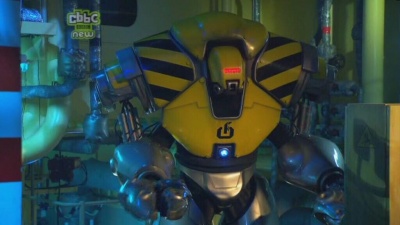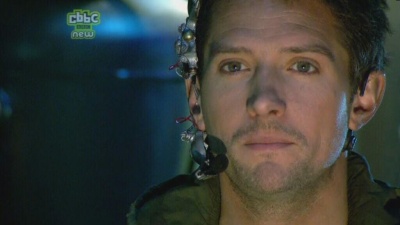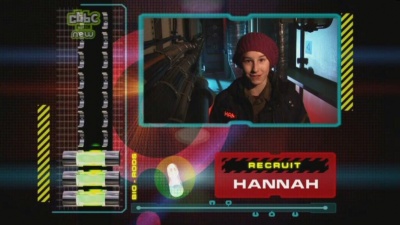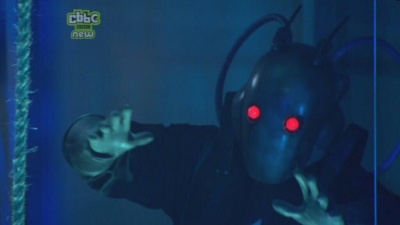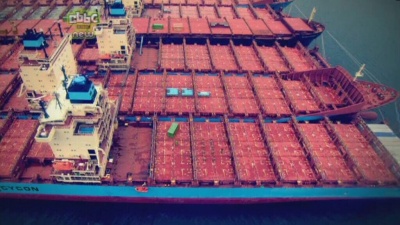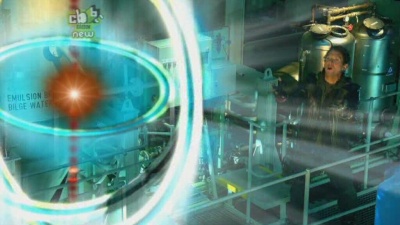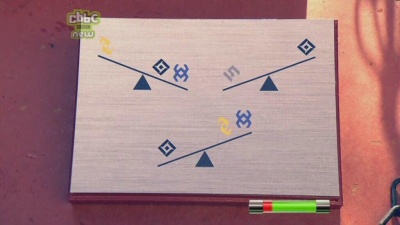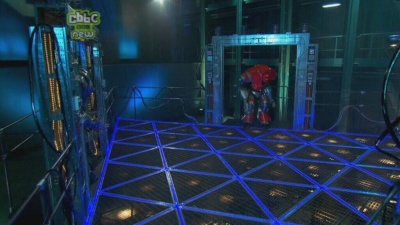Weaver's Week 2010-06-13
Last week | Weaver's Week Index | Next week
Contents |
Mission 2110
CBBC, 3-31 May
| As much as this column loves Raven the series, there are a few little aspects of the production that are perhaps less than excellent. The title character, for instance. Raven is powerful, imposing, but he's also a bit distant, and can come across as a little humourless. And then there's Nevar, portrayed as the source of all the evil in the land, actually turns up every week, yet Raven never bothers to use his magic staff thing and blast Nevar into being an ex-demon of mass destruction. Mission 2110 draws on many names familiar from the Raven production, topped by Sue Morgan, the show's executive producer. It addresses these little niggles, albeit by creating some of its own.
The basic plot is this: in about 2030, a toy company made a mint out of the Roboidz, real-life robots that children can play with. The inventor, a teenager called Laura Grant, went on to refine the concept and create real-life uses for the metal machines. Somewhere along the line, the Roboidz obtained intelligence of their own, and progressed from "I think, therefore I am" to deducing the existence of methods to wipe out all of humanity before anyone worked out how to turn them off. All of humanity was wiped out. | |
| All? No! One indomitable human survives, on board the Futuregate, a fleet of ships lashed together serving as the base for the Roboidz. Why would the 'bots have their base on ships in the middle of a freshwater lake? Don't ask, the script can have a little artistic license. Indeed, the whole backstory (presented in 60-second episodes on the CBBC website) is coherent and properly thought-through, like a good episode of The Sarah-Jane Adventures. Which is no surprise, because the Mission 2110 backstory was written by Phil Ford, who also writes for Sarah-Jane, and the Saturday spin-off show Doctor What.
Complete all the games on the website, and the story is explained. Well, that's what the publicity blurb says: we've never managed to get beyond level three, so the tale is still a bit of a mystery. If anyone's got an eight-year-old who completed all the levels in ten seconds flat and can tell us the important bits of the story, do get in touch. We mentioned that there was an indomitable human survivor. He's Caleb, played by Stuart Goldsmith. He's got everything a modern children's presenter could need: wit, humour, intelligence, a metal whisper clip over his right ear so that The Voice from Trapped can give him clues. Though Caleb isn't down with da kidz in a patronising manner, he's not averse to some slapstick humour, and is certainly a far more identifiable figure than Raven: an older cousin figure, rather than a well-meaning but rather gruff headmaster. | |
| The basic conceit of all the Mission 2110 missions is to obtain biorods. In theory, each biorod can be used as an almost-limitless supply of energy for a roboid, so if you remove a biorod, there's less of a threat from the metalheads. There are a couple of holes in this argument: primarily, if there are a squillion robots around, surely picking them off in such small numbers isn't going to have a major effect. The counter-argument is that surely doing something is better than doing nothing, and it is possible to move a mountain one teaspoon at a time, it just takes an awfully large number of teaspoons.
Less philosophically-minded viewers may be more concerned with the way biorods have a multitude of uses. Not only are they power sources for the 'boidz, but they're also a scoring mechanism, and a target for recruits to aim at. Surely possession of the Super Bio-Rod would make anyone the prime target for the agents of evil, unless it's a sword of destiny and the bearer is untouchable? Not as well explained as it might be, and – in truth – a minor quibble. | |
| All of this is fine science-fiction, as far as it goes, but where's the game show here? We mentioned that Caleb was the one surviving human, and he's infiltrated the headquarters of all things Roboid. He's constructed a time portal, presumably using instructions printed in the Fifty-Ninth Blue Peter Book, and has used it to bring some recruits from a hundred years ago into his world. He'll test them on the skills they need to deactivate robots, and will send the best of them to defeat the brains behind the whole outfit.
The challenges themselves are familiar territory for adventure shows: collect items while being pursued by baddies, perform various feats of manual dexterity, complete a task before your opposition (whether that's other players or time), and be good at strategy and thinking. The dressing is unfamiliar: the bad guys are represented by various types of Roboid, powerful mechanised killing machines that look like overgrown children's toys because they are actually overgrown children's toys. That's the backstory. Also on the ship are some Shades – things that used to be human, but are now rotting hulks of flesh, dark shapes in space, identifiable only by their pungent odour. | |
| It's clear that Mission 2110 has had some money thrown at it. The budget didn't quite run to making the show on board a space ship, but they did manage to find a disused cargo ship, lending a grimy industrial environment to proceedings. The show filmed in Loch Striven, where Maersk Line have six modern ships tied together in a floating raft. They were built to be speedier, nippier, shuttling at a fast pace between the Americas and China. But they barely saw service, because running at 30 knots requires an awful lot of fuel, and the price of fuel went through the roof a couple of years ago. So they're sat in a sea inlet, waiting for the economy to recover, or a fresh supply of lemon-soaked paper napkins, or something.
And so it was that the Maersk Boston was turned into the studio for a children's production. The contenders are kitted out in thick jackets and wooly hats, they'll have been doing much of the recording in the depth of the recent winter, and it wasn't exactly a warm winter. Readers with good memories will think of the Industrial zone from The Crystal Maze, only more grubby. It's an atmospheric setting, slightly menacing, and exactly right. That said, it's a slight shame that so few challenges actually used the height of the cargo holds – so many of them could have been played in someone's living room, they were so physically flat. | |
| There are other indications of expense being spent. Laura Grant's characters are played by Lindsay Duncan from various costume dramas. We say characters because there are characters – Cybele is an oracle, paged by Caleb each episode, giving him advice and encouragement. At times, this set-up came across as contrived and had us thinking of Jaga and Lion-o from Thundercats; on only one occasion did Caleb clearly alter his actions on Cybele's advice. The other character associated with Laura Grant was Neuros, the übermensch for the Roboidz, and if Neuros gets powered down, the rest of the canheads will stop functioning.
As well as his daily briefings with Cybele, Caleb records some video diaries, and tries to contact any other humans who might be out there. All this serves to pad out the show to the right length, without making it obvious that they're padding. It's the second most impressive aspect of the show, behind only Peter Dickinson's End of the World Voiceover (TM). When he's working on quotidian fluff like The X Factor, we can't help but feel that he doesn't actually mean what he's saying. We didn't have to suspend disbelief here, as Peter Dickinson's End of the World Voiceover (TM) was used to explain how the world as we know it came to end, and to give the show's insanely instant catchphrase when each contestant began their task: | |
| "Mission on!"
It's a brilliant catchphrase. Absolutely obvious, explaining precisely what's happening with no padding. Just slightly out of the usual turn of conversation, not so that people would be confused if someone came out with it, but so that they'd be aware it's a catchphrase. We're filing it alongside such other instant classics as "You lose, you choose". We've barely mentioned the games so far, have we? Something like two-thirds of the show's spent doing the games, and they're perhaps the least remarkable part of it. As we've noted, the games themselves weren't that remarkable. Oh, we loved the "blow up your own Roboid" game, where contenders were asked to find the heaviest weights from a set – not because it's a culture-free logic puzzle, but because when done correctly, it led to a special effect of a Roboid being pulled apart, limb from limb, and landing in the loch. For most of the games, the jeopardy level was low if not zero – rather than Raven zapping contestants out of dangerous situations with his magic staff, the Mission 2110 recruits would use panic buttons to do almost exactly the same thing. At various points in the week, the contestants would play The Vaporiser. Caleb used a similar line before sending the contenders in, and we think this was intended as the show's catchphrase: "Good luck, and to one of you, goodbye." The Vaporiser was a grid of equilateral triangles, with the contestants aiming for the middle of the opposite side, or the centre of the grid, while trying to avoid making contact with any of the Roboidz who were clomping about the grid, or the Shades who were waving their arms like arm-waving Shades. Though this owes a slight debt to the Vortex from The Adventure Game, it's only a slight debt. The main difference: the contestants can always see their opposition, and half the time they know where the opponent will move next. We were rather hoping that the baddies would make some moves under their own steam in finals week, but this didn't come to pass. | |
| Indeed, finals week itself was but a single day. It included a competitive version of the Remember the Sequence game we've recently seen on Push the Button, complete with players trying to bluff each other out into making a wrong move. Does that mean that Antan Dec are agents of the Roboidz? Are they smelly, stinky, foul Shades, or was that the stench of failure surrounding their recent series?
Anyway, returning to the ship, there was also a slight return for The Last Stand 1.0, in which Nevar fired paintballs at final-week contestants. In this variant, the last contenders fired paintballs at targets on the ship's deck. The magic of television turned the paintballs into laser beams, and inserted footage of a Roboid army marching slowly towards the finalists. The last challenge was also familiar to Raven fans, being almost identical to Thrall Threads, only played with laser beams rather than strings with bells on. We watched all thirteen episodes of this show, and reckon that the final week might at least have been extended beyond one episode. All the heats followed exactly the same path – if it's halfway through Tuesday's episode it must be time for Raise the Washing Powder – and the show stood or fell on its characters, both those of the actors and those of the contestants. The young contestants were encouraged to be a little cheeky, not to be deferential, to react and talk about their honest feelings without any worries that they'll come across as anachronistic. We saw it all, we would like more, and though there are flaws, they're not going to be impossible to fix for a second series. If we get one. We've certainly got a new catchphrase. |
Takeover Bid
Our Business Desk isn't the most accurately-named: rarely do we have a story from the world of high finance, and there's a stack of ten-shilling notes in the bottom drawer in case we need to hail a hansom cab to the Stock Exchange. The piles of dust and cobwebs have been well-and-truly disturbed in the last week, with two corporate takeovers to report.
First, RDF Media has been sold to Zodiak Entertainment. RDF, makers of such fine shows as Scrapheap Challenge and Ladette to Lady, is now in the same corporate umbrella as Wallander and Totally Spies! We're intrigued by some of the cross-fertilisation opportunities this offers. There could be a third British version of Fort Boyard (as Adventure Line is another Zodiak company) hosted by JK and/or Joel, and incorporating many of their games from Escape from Scorpion Island. And rather than those somewhat tedious duels with the Maitres de Tenebre, contestants will have to go a round with La Grande Dame du Mur Connectant.
Elsewhere, we hear that British Sky Broadcasting has bought the Virgin Media Television operation. VMTV – formerly known as Flextech – operates the various Living, Bravo, and Challenge channels, and a portmanteau Virgin 1 channel. BSB is paying £105 million, with a further £55m contingent on securing regulatory approval in Ireland, and possibly from the EU. In return, Virgin's cable operation will be able to screen the various BSB-branded channels for the next nine years, always assuming the viewers can find anything worth watching.
This is either BSB continuing to exploit its monopoly position, or a company throwing bad money after bad channels. Challenge, in particular, has been run down over the past year to be a tired repeats channel; apart from repeats of Winning Lines (themselves delayed from last summer), we don't think Challenge has brought anything to the table in years. It's not good news when the channel most likely to contain new and exciting game shows isn't the dedicated game show channel, but the public-service children's channel.
This Week And Next
Readers may have noticed that Britain's Got Talent finished at the weekend, with Simon Cowell once again crowned the Most Talented Man in Britain, at least when it comes to persuading people to put their hands in their pockets and transfer the contents to him. If we're to believe the tabloid press – something we tend not to do – Mr. Cowell "knows what the public likes and he works tirelessly to give it to them." More bad karaoke covers of 'Unchained' melody, anyone?
The articles also suggested that Britain's Got Talent had gone backwards this year, which is actually an idea we might watch: start by revealing the result of the phone vote, then have one to determine the winner (so far, so much ITV's standard), then have some semi-finals introducing more and more mediocre acts, before finishing with the First Audition Programme, in which all the useless no-hopers are weeded in by Sid and Doris Tonedeaf, Mr. Cowell's Lack-of-Quality Controllers. Yours for the taking, VTI.
Doubtlessly uninterested in this proposal is Richard Klein, the controller of BBC4, and the only television executive to share his name with a topological surface. As well as his comments on that writing in the top-left corner of the screen, and his RTS award-winning Charlie Brooker (we may be seeing less of at least one of these), he's been discussing whether there should be more episodes of Only Connect. We've thought about this a little, and reckon that actually, no, there shouldn't be fifty new episodes a year. All the best shows have their time on air, and then some time off air, allowing us to anticipate their return all the more. How can event television be event television when it's on every week?
This week's quietly obscure Event Television, and by far the biggest Blue Peter-related news of the week, was CBBC's Star Striker competition. Ten child-friendly celebs tried their football skills against each other, and goodness, we've finally found something Helen Skelton can't do! It's only taken two years to reach a limit. Contestants from all the major talent-spotting shows took part: Olly Murs from Deal or No Deal finished fifth, Faryl Smith from Cowell's Got Royalties came second, but the show was won by Mark Rhodes, proving that Pop Idol beats 'em all.
Ratings for the week to 30 May are in, and Britain's Got Talent topped once more, 10.4m saw Saturday's show. Thursday's Have I Got News For You came second with 5.65m, and the Eurovision Song Contest averaged 5.6m, just ahead of Junior Apprentice on 5.5m. The Whole 19 Yards bowed out on 4.7m, the highest rating of the season, quite remarkable for a sunny bank holiday. Dickinson's Real Deal crept into primetime on Friday, 2.7m saw the edition. On Channel 4, the Come Dine With Me game show special had 2.85m viewers, with over a third of a million seeing the show on 4+1. The Million Pound Drop's best night was Friday, when 2.35m saw events; the Mastermind final and Have I Got a Little Bit More News For You both had 2.25m. Here's a surprise: Come Dine With Me was the most popular game show on digital television, 875,000 saw Sunday's repeat. Britain's Got Talent had 710,000, and the after-show 665,000. Pop Idle Us bowed out on 640,000. Britain's Got Talent was augmented by 470,000 on ITV-HD, Eurovision by 245,000 on BBC-HD.
We've reached the summer finals week, and will find the champions of Fame The Musical (RTE1, 6.30 Sunday), Counterpoint (Radio 4, 1.30 Monday), and Countdown (3.25 Friday). There are also new series of topical quizzes Mock the Week (BBC2, 10pm Thursday) and Bwlletin (Radio Cymru, 6pm Friday).
To have Weaver's Week emailed to you on publication day, receive our exclusive TV roundup of the game shows in the week ahead, and chat to other ukgameshows.com readers, sign up to our Yahoo! Group.

